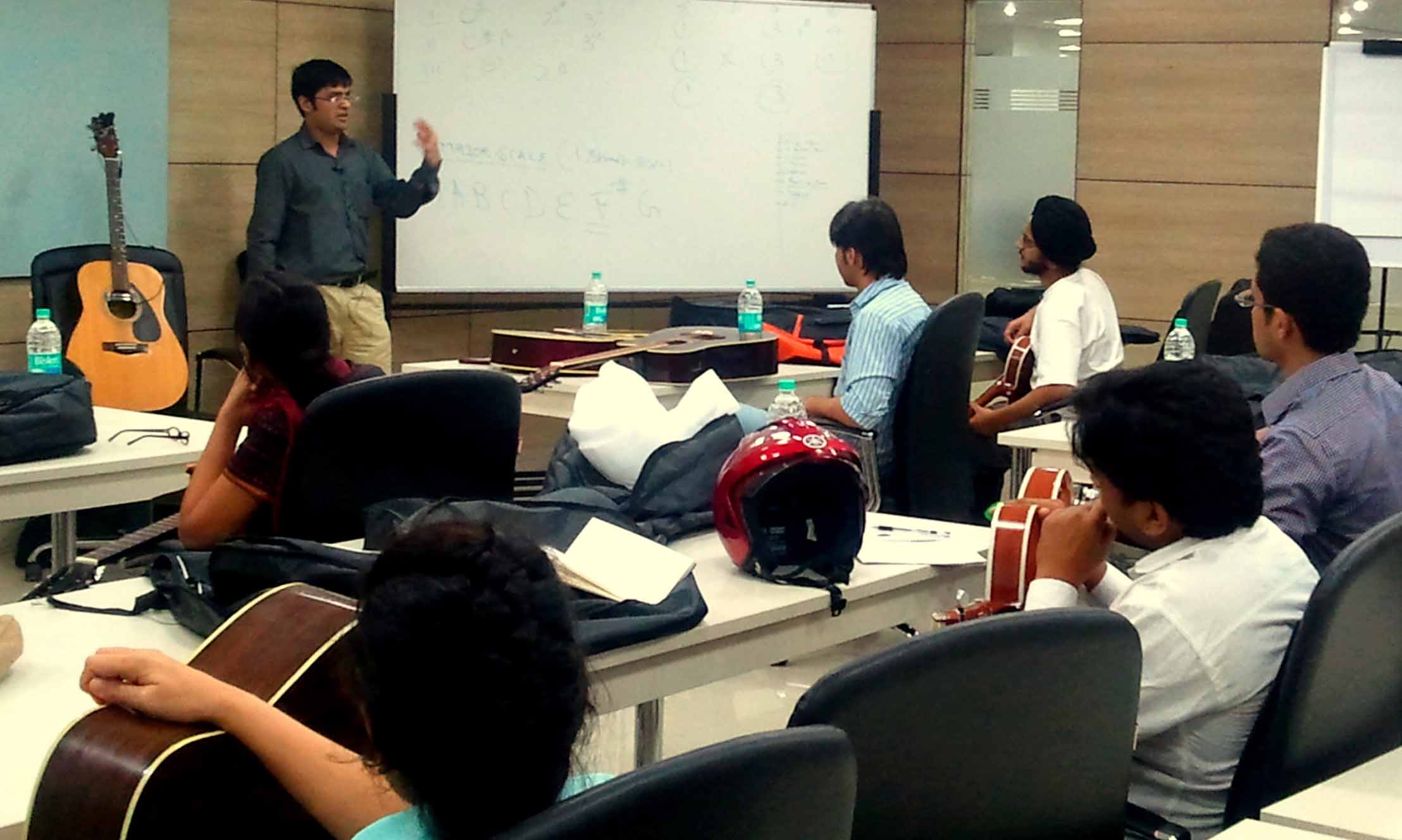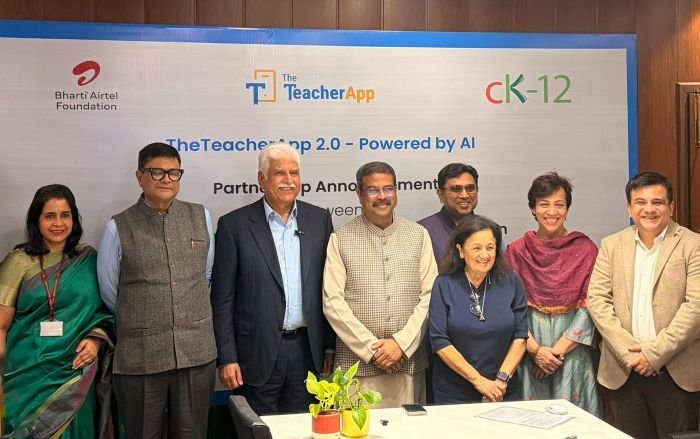
That cortex Lobes are more functional and even grow with learning of music or performing must be a good enough reason to let music education bloom
 Delhi-based guitarist, Kapil Srivastava, an alumnus of Delhi University, has in several ways redefined the power of music education by adding customized and corporatizing educational programs and a very robust delivery mechanism both though physical as well virtual classrooms. These programs offered under own created brand of ‘Guitarmonk’ have already created an impact across the world. Kapil Srivastava, the new age Music Education Guru reveals some interesting facets of his passion, success and music education to Curriculum magazine
Delhi-based guitarist, Kapil Srivastava, an alumnus of Delhi University, has in several ways redefined the power of music education by adding customized and corporatizing educational programs and a very robust delivery mechanism both though physical as well virtual classrooms. These programs offered under own created brand of ‘Guitarmonk’ have already created an impact across the world. Kapil Srivastava, the new age Music Education Guru reveals some interesting facets of his passion, success and music education to Curriculum magazine
Tell us about the journey of Guitarmonk, how did it begin? There must have been a few defining factors as there are hundreds of instrumentalists or musicians around with some form of success but not everybody thinks how you went about?
KS: I was a street musician, hailing from a nondescript middle class family having no-inclination towards music but only in government jobs! However, I was good at playing the guitar and used to do live shows after 12thclass and earn a bit too. And there came a point when my family used to ask, “Can music give you stability for next 20 years? “ And that’s how I developed a vision for business proposition in music learning.
Guitarmonk was a character that I had visualized in my mind. An amalgamation of monk (like Vivekananda) + guitar (modernity), I see this character as me-shining, rising and expanding globally. Guitarmonk was a sort of a ‘superman’ in my eyes, like a winner. A philosophy emerged to overcome social dogmas and everything else, besides. For every question these two words ‘guitar’ and ‘monk’ were enough of an answer. Who says words are not magical? They are. It is merger of east and west that is embodied in Guitarmonk.
Before we go further, let’s also go down the memory lane, what inspired you in the first place to learn music? At what age and where did you start? And, why guitar?
KS: During my school days I had an extraordinary fascination for the Guitar, (almost seemed like a lost previous life attachment). I was able to pick out or disassociate guitar tone in a complete mixed song. I used to freeze on the road if I got to hear any song being played at a local ‘paan-bidi shop’ if it were a guitar piece. I used to ask my Sanskrit teacher who had a beautiful voice to sing a song , when the rest of the class would to go to sports ground and play. It was then I realized that music was extremely important to me and I could not imagine a life without the guitar. I had to learn to play it, whatever the cost. I started guitar as a 10-year old through school lessons but then formally started learning it after my 10th class exam after I turned 15 years.
Coming to Guitarmonk, you have a well-laid division for various categories. Can you briefly let us know what is on offer for appropriate categories say schools, small children, college goers, hobbyists, organizations etc.
KS: We have modeled our education programs on the needs and priorities of organizations/individuals. Different organizations and individuals have varying priorities and needs: some want to do it for personality development, others want to pass time. Some seek creative rejuvenation and some look at it professionally. Even corporates have varying philosophies- they sometimes want to engage their employees and sometimes they want to educate them seriously too. We offer different solutions for different needs so that everybody finds success in what they want.
Music education has had a rich tradition in India and when new age schools came into existence, music classes appear to be everywhere. But then an overwhelming majority of them are just on admission brochures, non-starter classes. Today’s school children don’t appreciate the power or value of music. What is your observation?
KS: In many schools music is just a formality for seeking admissions. Music teachers are recruited by principals and other staff who have no knowledge of music, and then the same teacher is conducting the SUPW activity as well. So students in classes from 6 to 10 have the same music teacher and they are not even at the initial level which can be reached merely by spending a few sincere hours; even after having given 5 years i.e. 100s of hours to music learning.
There is a wrong notion about music in mindset of people. For some it is the flavor of the season or a highway to stardom, fame, riches, fan clubs, etc., which is all hogwash. For others, it is a distracting activity; it is fun, anti-study etc. which is also untrue. And, for some it is a classy and superior activity and for some others it is rather inferior. Therefore, I would like to highlight some facts. Just like you study math and science in school and don’t necessarily become a mathematician and scientist respectively, participation in music or arts doesn’t make you a musicians or artist in a go; you need decades of hard-work, consistency and regularity to be a musician or artist.
Then music is also said to make you intelligent and concentrate on studies…
KS: Yes, a study highlights that the majority of engineers at Silicon Valley are practicing musicians. A part of brain known as ‘cortex lobes’ is more functional/grows when you learn/perform in music. So new age schools are realizing the importance of music for their students; they are seeing it as contributing to their school quality performance. Music learning is not against students. On the contrary it enhances your IQ, improves brain activity, improves spatial intelligence and betters academic growth. It is now even considered more important than computers at elementary level education in USA. Many parents have started realizing it now. Many corporate have made it mandatory as part of their employees engagement activities too. This new modern society need music, particularly at the time of increasing aggression, road-rages and crimes, as indispensable to complete personality growth of an individual and better loving society. Music not only contributes to high self esteem, shared activity but teachers control and patience to students.
You have several corporate clients. Tell us from your own experience or study does your music therapy defang stress?
KS: It is difficult to explain but you have to experience it and realize the difference. Just like a medicine works on body, soothing vibrations from music work on a body and induce various changes like slowing the pulse & heart rate, improving blood pressure, reducing emotional distress, anxiety and improvement of mood and quality of life. Various researches have been carried out on therapeutic effect of particular Ragas on certain diseases and disorders particularly insomnia, anger, mental instability and a plethora of other diseases. After lot of research, we initiated a concept called ‘KAYOTSARG’ working on various ragas that heals. We recorded those ragas under our album titled ‘Kayotsarg Music series’. It leads to increased productivity, stress reduction, reduced anxiety levels and spreading a favorable friendly environment that will soothe the nerves and create a positive energy around. These albums are now a part of clinics of various doctors, corporate etc. We also offer single session Music Therapy Workshops to various organizations.
You are present in Delhi NCR and Dehradun, and also have ventured online. What is the roadmap for guitarmonk in coming few years?
KS: We are searched across 175 countries every year, and our courses are actively running in 11 countries as online. Our goal is to open physical centres in 5 more cities this year and spread across 30 cities in next 3 to 5 years. We have started specialty job oriented programs in different music subjects.
How do you see the future of music education especially in digital age and globalization?
KS: There are many aspects to this question: from the perspective of a student, teacher, future security, competition, investments etc. Let me talk in the context of India. As with other industries, India is now seen as a big music education & retail market by foreign universities and companies. It is being swamped by outside players. Digital age is helping technology driven individuals to market pro-actively, penetrate new territories online as they are well experienced and many are well funded and established in their countries. There is a too much of education under the garb of foreign certification and attractive packaging, where everybody is saying they are the best; while on the other side there is risk of loss of both quality knowledge and opportunities for Indian musicians and teachers in absence of their inability to improvisation and use technology. India is a country rich with diversified cultural talent and our unique heritage of yoga, spirituality, music is unbeatable. I advice parents and students not to go for suspect foreign certificates and good looking packaging; but choose a good musician, a professional education system and a commitment that gives you return and value for your time and money. On a positive note, overall future points towards development and full of growth that is innovative and inspiring. Music education industry is becoming bigger, with more jobs, increased market size and a growing cut-throat business.
Thank you






